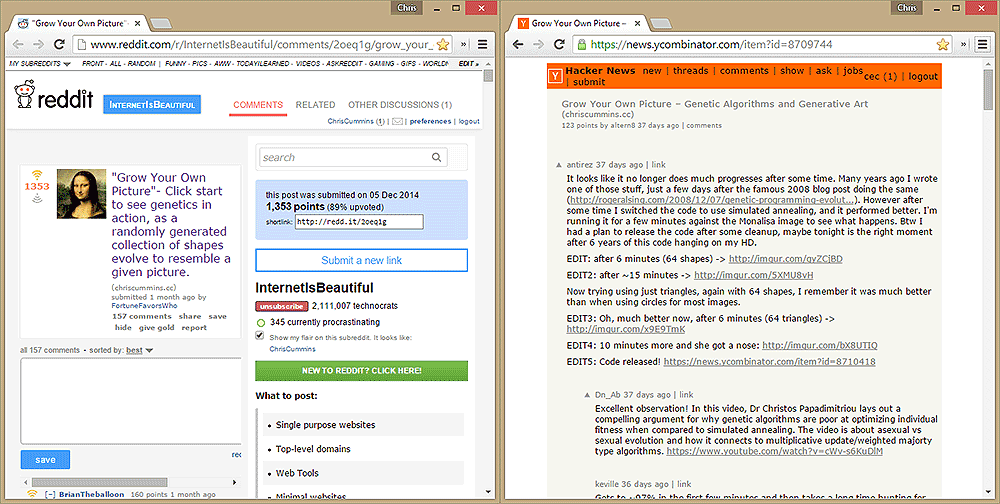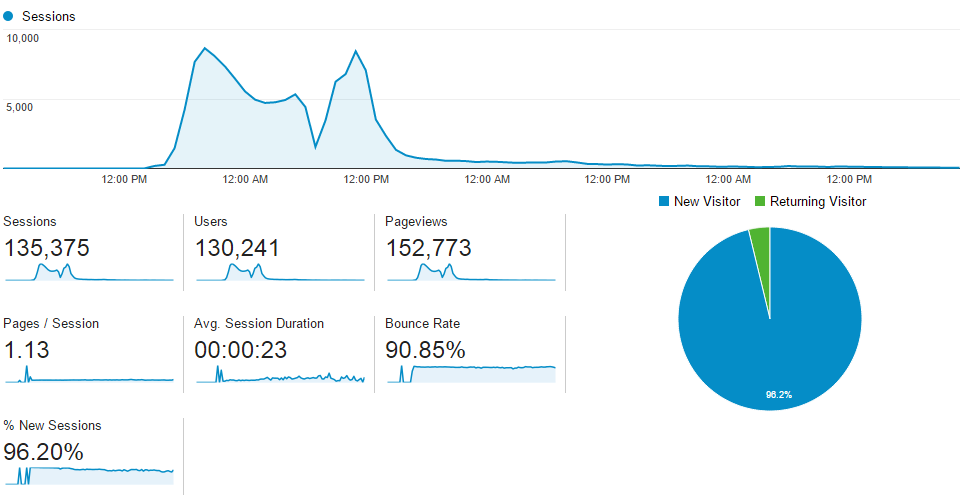The weekend that 130,241 people dropped by
Did you know you’re on the front page of Reddit?
It’s for reasons like this that I check my phone. As I sat quietly enjoying a mulled cider with some friends at the pub, an old classmate had sent a message to let me know that someone had posted my Grow Your Own Picture demo to Reddit, and it had received over 1000 upvotes in just a few hours.
I suddenly became a bit fidgety and eager to leave. I needed to get behind a keyboard. This post was hot. I was trending. Two hours later and I confirmed my new found internet celebritydom. First Reddit, then Hacker News. For a brief few hours, a tech demo that I had hacked together as a weekend project was front page news on the biggest geek sites around.

Once the initial excitement and shock had died down, I realised that I actually didn’t have much to do. Sure, I could comb through the comments or repeatedly refresh my site analytics, but ultimately I could just sit and ride this one out. In the quantified age, this is what your 15 minutes of fame looks like:

While I fully expected this popularity to be transient, it did surprise me the rate at which traffic disappeared. The half-life of internet hype is short indeed.
A week later, there’s little to show for this except a slightly higher level of background traffic (around 3000 hits a week, as opposed to 30), and a handful of the super-keen who had got in touch about implementing new features or who had starred my GitHub repo.
So what did I learn?
- Attribute your sources. I was inspired to create my demo after stumbling across a JavaScript implementation of Genetic Algorithms. The use of Genetic Algorithms to approximate fine art is not a new one, and can be attributed to a blog post by Roger Alsing. With the exception of a note buried within the source code, I had not made these acknowledgements clear, which led some people initially to comment that my code was stolen. It would never be my intention to mislead or take false credit, so a quick patch was all that was needed to ensure that I didn’t offend an of my inspirations.
- Don’t underestimate the silent majority. The number of votes or comments that a post receives in no way resembles the number of people who click the link. The ratio of people who click the link to people who leave a comment is 1000 to 1. The true hero in this story is GitHub pages, which freely (in all senses of the word) scaled from 0 to 100,000 sessions without so much as a dip in page load times.
- Write like you have an audience. For many professional developers I shouldn’t expect that this is beyond what they are already familiar with, but for someone like me. a largely self-taught script-kiddie-turned-FOSS-hacker, it’s worth keeping in mind that almost anything you write may well be looked at by other eyes. It’s easy to become so familiar with writing for yourself that you give up on good code practises. I never expected my little demo to be scrutinised, I’m just glad looking back that it was programmed reasonably - even with some comments!
In all, it was a real pleasure and rare experience to be able to share and have scrutinised the fruits of my labour.
A sincere thank you to everyone who dropped by and enjoyed my little demo, and I am so happy to have inspired some people to take their keyboards and start building their own cool stuff! You have made one lowly bedroom hacker very proud.





